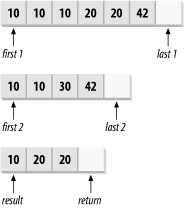Name
set_difference function template — Computes set difference of sorted ranges
Synopsis
template<typename InIter1, typename InIter2, typename OutIter> OutIter set_difference(InIter1 first1, InIter1 last1, InIter2 first2, InIter2 last2, OutIter result); template<typename InIter1, typename InIter2, typename OutIter, typename Compare> OutIter set_difference(InIter1 first1, InIter1 last1, InIter2 first2, InIter2 last2, OutIter result, Compare comp);
The set_difference function
template copies elements from the sorted range [first1, last1) to the range starting at result. Only those elements that are not
also present in the sorted range [first2, last2) are copied. An iterator that points
to one past the end of the result range is returned.
The result range must not overlap either source range.
The first version compares items using the < operator. The second version uses
comp(X, Y) to test whether X <
Y.
Figure 13-17 shows an example of a set difference using multisets.
 |
Technical Notes
Precondition: !(*(i + 1) < *i) for all i in [first1, last1 - 1) and !(*(j + 1) < *j) for all j in [first2, last2 - 1).
Postcondition: !(*(i + 1) < *i) for all i in [result, return - 1).
The set_difference function
template assigns *(result +
n++) = *(first1 + m) for all m in [first1, last1), in which *(first1 + m) is not in [first2, last2). It returns result + ...
Get C++ In a Nutshell now with the O’Reilly learning platform.
O’Reilly members experience books, live events, courses curated by job role, and more from O’Reilly and nearly 200 top publishers.

